How AI in DAOs is Transforming Governance
AI in DAOs enables a fast, innovative, and transparent governance process. DAOs without AI face a complex governance process, which slows down the decision-making process in the community.
AI comes in daos to overcome these complex governance decision-making challenges. AI can gather a large amount of data from blockchains and social media platforms. Analyzing these data piles suggests incoming threats and predicts outcomes with its power to read human sentiments, including emotions, opinions, and engagement, which helps AI reduce human bias in decision-making, if present.
The integration of AI in DAOs presents challenges. Significant challenges are transparency and algorithmic bias. In other words, overreliance on automation is fraught with risks. This situation arises in a conflict over whether to prioritize AI or human insight. We can’t remove any of them from the scene. We can use AI as an assistant, not a single force to drive decisions.
How Decentralized Organizations—DAOs are Revolutionizing Blockchain Governance.
Benefits of Using AI in DAOs
The benefits of using AI in DAOs are as follows:
- Data-Driven Decisions – AI makes decisions on the basis of data gathered from off-chain and on-chain. This data helps community members make the right choice in decisions.
- Faster Governance Processes – By fast analyzing the power of AI, it becomes easy to categorize rules for governance. On the basis of these groups, the Dao community members prioritize decisions.
- Predictive Insights – AI models have the power to analyse and compare things, which helps AI to predict what the possible outcome will be and what to avoid.
- Sentiment Analysis – AI can measure moods and emotions by reading social media discussions and help community members to align decisions according to the will of the people.
- Reduced Bias – AI analyzes data on objective realities, not emotional needs, so it becomes easy to decide right or wrong without any bias.
- Higher Participation – AI makes members’ involvement in the decision-making process easy by simplifying complex proposals and sending reminders on time.
📌 Related Read: “Exploring Governance Models in DAOs“
What Risks and Challenges Come With Using AI in DAOs?
- Lack of Transparency in AI Decisions – AI decisions are not transparent. They are fluff coz they give output without any authentic source. They generate it on their own, which makes it difficult to reach any conclusion. Theoretical Bias and Unfair Outcomes – AI decisions depend on the algorithms, which are based on the training data. This training makes decisions biased.
- Security Threats and Manipulation Risks – Hackers can poison AI models with poisonous information that misleads the models, resulting in a compromised governance process.
- Over-Reliance on Automation vs. Community Input – Over-reliance on automation undermines the true spirit of community-led decisions, rendering it a community led by machines, not humans.
Explore the 7 best tools for creating and managing DAOs.
What Could the Future of AI in DAO be?
The future of AI in daos will be a hybrid model, which makes AI an assistant. AI as a co-pilot helps people, not replace them. AI will make governance processes and proposals smoother, fair, reliable, and transparent. In the future, daos will be more adaptive rather than rigid. With human insight, daos will be human-driven
With more innovative governance tools, such as user-friendly dashboards and the ability to simplify complexities, DAOs can be made more user-friendly. This will build trust and give strength to decentralization.
The Dark Side of AI in DAOs – Risks & Challenges
Artificial Intelligence (AI) holds incredible promise for improving decision-making in Decentralized Autonomous Organizations (DAOs). Its potential to streamline processes, eliminate inefficiencies, and ensure fairness is undeniable. If mishandled, these challenges could undermine the very essence of decentralization that DAOs stand for. Below, we explore the critical risks associated with AI in DAO governance and how they could disrupt the balance between efficiency and trust.
Infographic: How to Solve the Top Risks of AI in DAOs
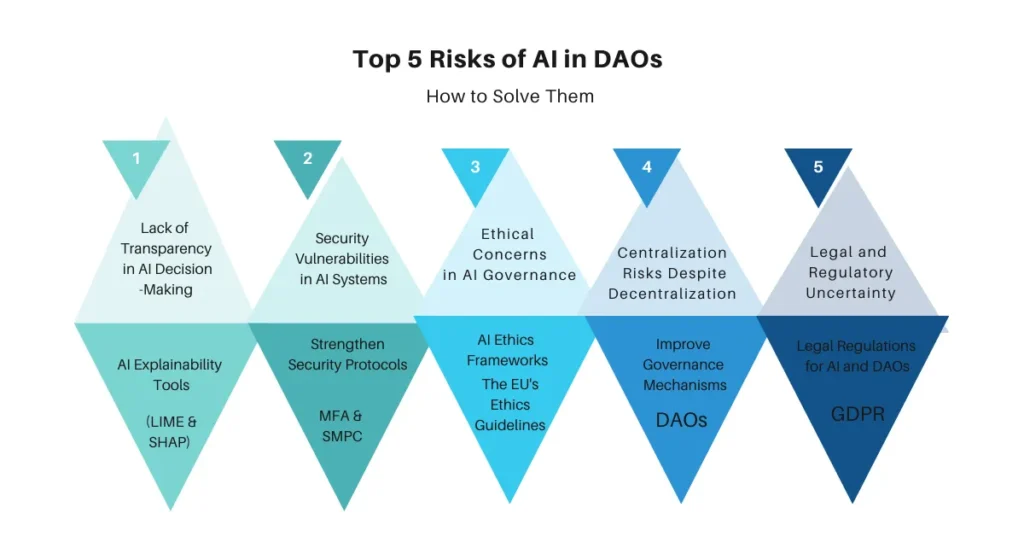
Potential Dangers in AI-Driven Governance
AI Governance Capture
One of the most pressing concerns is what happens if an AI system governing a DAO is hacked or manipulated.
Unlike traditional organizations with centralized oversight, DAOs lack a single authority to intervene in such scenarios. This decentralized structure, while a strength, leaves DAOs particularly vulnerable to bad actors.
For example, if an AI is compromised by hackers, it could:
- Alter governance proposals.
- Misallocate funds.
- Prioritize certain stakeholders unfairly—all without immediate detection.
This creates a significant risk where the very tool meant to enhance governance becomes a central point of failure.
Without robust safeguards and community oversight, an AI-driven governance system could inadvertently introduce weaknesses into the DAO framework, undermining the principles of transparency and decentralization.
Algorithmic Bias
AI Bias Mirrors Data Bias
Impact on DAOs
In a DAO context, biased AI could:
- Prioritize proposals from large token holders.
- Sideline minority participants.
- Promote decisions aligned with past inequitable behaviors.
The Risk of Reinforcing Power Imbalances
Instead of leveling the playing field, biased AI could further entrench power imbalances within the community. For instance, a DAO aiming to promote inclusivity might unknowingly deploy an AI that amplifies the voices of already influential members due to poorly designed algorithms.
Consequences for DAO Goals
Such biases don’t just harm the DAO’s core mission but could also:
Lead to disengagement from the broader community.
Alienate underrepresented members.
Transparency Issues
Transparency vs. AI Black Boxes
Transparency is a cornerstone of DAO governance, yet AI’s decision-making often operates as a “black box.”
The Problem with Opaque Decision-Making
Advanced machine learning algorithms analyze data and produce outcomes, but the reasoning behind those outcomes is frequently unclear.
Impact on Member Trust
- Feeling excluded from critical decisions.
- Uncertainty about how AI prioritizes proposals or allocates resources.
Consequences for Participation
If members don’t trust the AI’s processes, they may:
- Question the system’s fairness.
- Reduce their participation and engagement in the DAO.
Long-Term Risks
Over time, growing skepticism could destabilize the entire organization, undermining the principles of decentralized governance.
How DAOs Can Mitigate These Risks
- Implement Human-AI Collaboration: Introduce mechanisms where human oversight can review AI-driven decisions, ensuring that errors or manipulations are caught early.
- Conduct Regular Audits: Regularly evaluate and update AI algorithms to address biases, vulnerabilities, and inefficiencies. This builds trust among community members.
- Promote Community Education: Ensure that DAO members understand how the AI works by providing accessible, transparent explanations of its processes. When members are informed, they’re more likely to trust the system.
- Decentralized Oversight of AI: Introduce tools and processes that allow the community to actively audit and govern the AI itself, ensuring that control is distributed and inclusive.
Real-World Solutions to Address Challenges
To balance AI’s benefits and risks, platforms like DAOhaus offer innovative solutions for community-centric governance. By providing customizable governance tools, DAOhaus allows members to maintain control while exploring AI integration responsibly.
Learn how DAOhaus supports transparent and decentralized governance to mitigate AI risks.
Balancing Opportunity with Risk
While AI in DAOs offers tremendous potential for efficiency and innovation, the risks associated with its use cannot be ignored. Governance capture, algorithmic bias, and transparency issues highlight the need for careful implementation. DAOs must strike a balance between leveraging AI’s capabilities and preserving the principles of decentralization and community-driven governance.
What do you think—can DAOs effectively manage these risks, or do they outweigh the benefits of AI-driven governance? Share your thoughts below! 👇
The Future – AI and DAOs in 2035
The future of AI and DAOs is truly revolutionary. By 2035, DAOs powered by AI will become smarter and more efficient, fostering unprecedented levels of transparency. This fusion will transform governance and operations on a global scale. The following diagram represents the convergence of AI and DAOs, showcasing the groundbreaking evolution that will leave a lasting impact on the world.
A Visual Breakdown of the Future of AI-Driven Governance and DAOs
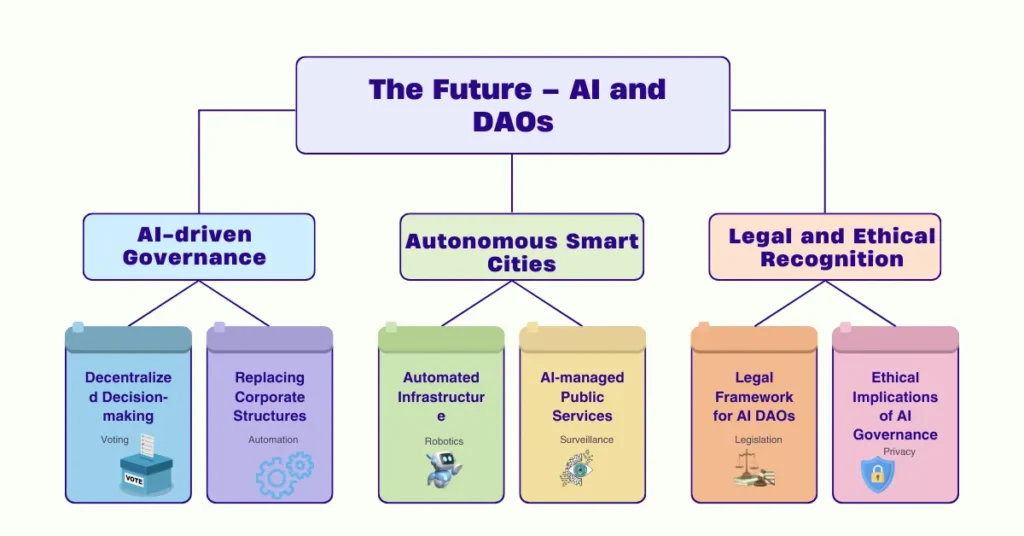
AI-Driven DAOs Replacing Corporate Governance
Imagine a world where traditional corporate boards are replaced by AI-powered DAOs.
By 2035, we could see companies entirely governed by decentralized systems, with AI managing:
- Proposal evaluations.
- Budget allocations.
- Conflict resolution.
These DAOs could operate with unparalleled efficiency, free from human biases and corruption. For instance, quarterly meetings could be replaced with real-time decision-making powered by data-driven insights. This shift could lead to flatter organizational hierarchies and more inclusive decision-making structures. However, the question remains: Will employees and shareholders trust AI to act in their best interests?
Explore the best DAOs to kickstart your blockchain journey in 2025 and learn about beginner-friendly DAOs that align with your interests and goals.
Autonomous DAOs Running Smart Cities
One of the most revolutionary possibilities is AI DAOs managing smart cities.
Picture this:
- AI monitors energy consumption in real-time, ensuring sustainable use.
- Governance decisions about public services are decentralized and made transparently.
- Infrastructure, transportation, and waste management are optimized through AI systems.
This could result in cities that adapt to residents’ needs seamlessly, reducing inefficiencies and promoting sustainability. A DAO might even use predictive analytics to prevent problems before they arise—such as rerouting traffic to avoid congestion or allocating resources during natural disasters.
But such systems raise critical questions:
Who programs these AI DAOs? Will citizens have enough say in their design and operation?
Legal Recognition of AI DAOs as Governance Entities
By 2035, we might witness the legal recognition of AI DAOs as independent governance entities.
For example:
- Autonomous DAOs could sign contracts, make investments, or even represent communities in legal matters.
- Governments might draft regulations acknowledging these entities as legitimate “digital citizens” or organizational bodies.
Such recognition could blur the lines between human and machine governance, raising debates about accountability and ethics. What happens if an AI DAO makes a flawed decision? Who holds it accountable—the developers, token holders, or the system itself?
Ethical & Philosophical Implications
While the benefits of AI DAOs are evident, the ethical dilemmas are equally pressing:
- Do we risk over-relying on AI for critical decisions?
- How do we ensure that these systems remain fair and transparent?
- Can human intuition and moral judgment ever be fully replaced by algorithms?
A Glimpse into the Future
The potential of AI and DAOs working in tandem is immense, from revolutionizing businesses to managing cities. By 2035, we may live in a world where decisions are more efficient, transparent, and data-driven than ever before.
The question is: Are we ready to embrace this future? Or will the challenges of trust, ethics, and control hinder progress? Only time will tell.
Best AI Tools for DAO Governance in 2025 (Bonus Section)
As DAOs continue to evolve, integrating AI into governance processes is no longer a luxury—it’s becoming a necessity. To navigate this dynamic space, several cutting-edge tools have emerged, combining the power of AI with the flexibility of blockchain governance. Here’s a closer look at the top AI tools revolutionizing DAO governance in 2025:
1. Snapshot AI: Smarter On-Chain Voting Analytics
Snapshot AI elevates the traditional on-chain voting process by providing advanced analytics. It can assess voter behavior, detect patterns, and predict proposal outcomes, allowing DAOs to make data-driven decisions.
- Key Feature: Proposal impact forecasting using historical data.
- Why It Matters: By identifying voting trends, DAOs can increase member engagement and improve decision-making efficiency.
If you’re new to DAOs and want to explore how voting works, [learn how to join a DAO](link to article) to get involved in these exciting processes.
2. DAOstack AI: Predictive Modeling for Proposals
DAOstack AI specializes in predictive modeling, enabling DAOs to foresee how different proposals may affect the organization. This tool not only improves governance efficiency but also reduces risks by analyzing past decisions and current market conditions.
- Key Feature: Real-time predictive analytics to evaluate proposals’ impact.
- Why It Matters: This allows DAOs to avoid governance fatigue by prioritizing proposals that align with long-term goals and community interests.
For newcomers, understanding how to participate in these governance processes is essential. Don’t miss our guide on [how to join a DAO](link to article) to get started.
3. Aragon AI: AI-Enhanced Smart Contract Dispute Resolution
Aragon AI focuses on resolving disputes within DAOs by using AI to analyze and mediate conflicts. Its AI-enhanced smart contracts provide unbiased judgments, ensuring fair outcomes for all members.
- Key Feature: Automated dispute resolution with minimal human intervention.
- Why It Matters: This helps DAOs maintain trust and transparency while avoiding costly delays caused by unresolved conflicts.
AI Tools Shaping the Future of DAO Governance
The emergence of AI-powered tools like Snapshot AI, DAOstack AI, and Aragon AI is transforming how DAOs function in 2025. These technologies not only streamline governance processes but also enhance transparency and fairness. If you’re considering joining a DAO or learning about the governance ecosystem, check out our guide on how to join a DAO for actionable insights.
By embracing these tools, DAOs can bridge the gap between decentralization and efficiency, making governance smarter and more inclusive than ever before.
Conclusion – Can We Trust AI to Govern DAOs?
As we explore the evolving landscape of decentralized autonomous organizations (DAOs) powered by AI, the critical question remains: Can we trust AI to govern effectively? While AI promises increased efficiency, reduced biases, and data-driven decision-making, its lack of transparency and potential for manipulation poses significant risks. The fundamental debate is whether we should fully embrace AI as a governing force or maintain human oversight to balance the advantages of AI with the necessary ethical considerations.
So, what do you think? Are AI-powered DAOs the future of governance, or is the risk of centralized control too great? Should we trust AI to make critical decisions, or should human oversight remain paramount?
Drop your thoughts in the comments below! Would you join an AI-driven DAO, or do you believe AI governance is a step too far?
If you’re curious about how to get involved in DAOs, check out our Step-by-Step Guide on How to Join a DAO for actionable tips to start your journey step by step.
Frequently Asked Questions about AI in DAOs
What are the benefits of AI in DAOs?
AI improves efficiency, speeds up decision-making, and reduces human bias in governance. It analyzes proposals quickly, detects fraud, and automates tasks, making DAOs more effective and scalable.
Which DAOs are already using AI?
- SingularityDAO: AI for risk management.
- Aragon DAO: AI-driven dispute resolution.
- Bankless DAO: Exploring AI for governance tools.
Can AI replace human governance?
Not entirely. While AI improves efficiency, it lacks empathy and creativity. A hybrid approach—where AI supports humans—is the preferred model for balanced governance.
Is AI in DAOs legally recognized?
Not yet in most places. Some governments are exploring frameworks for legal recognition, but AI-powered DAOs still lack widespread legal status.
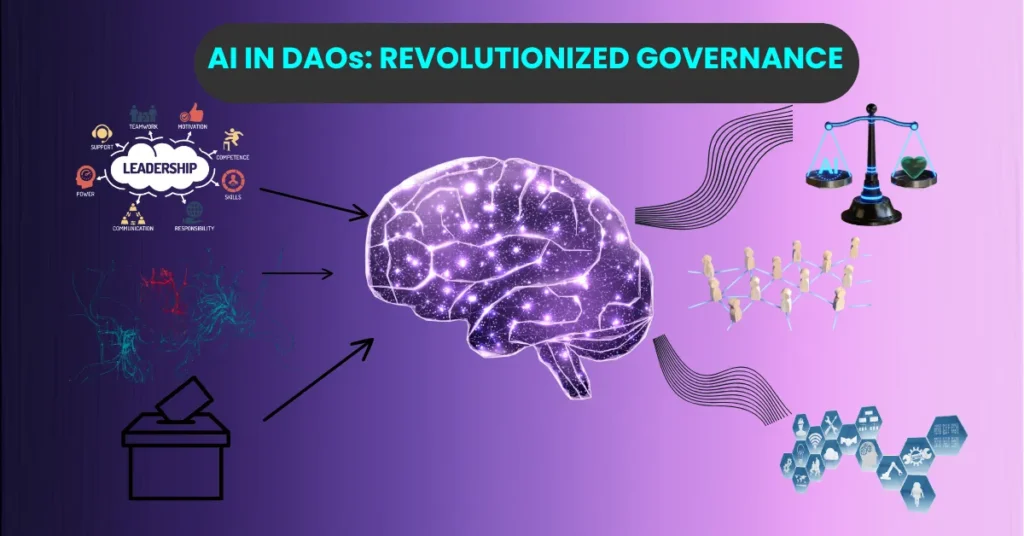
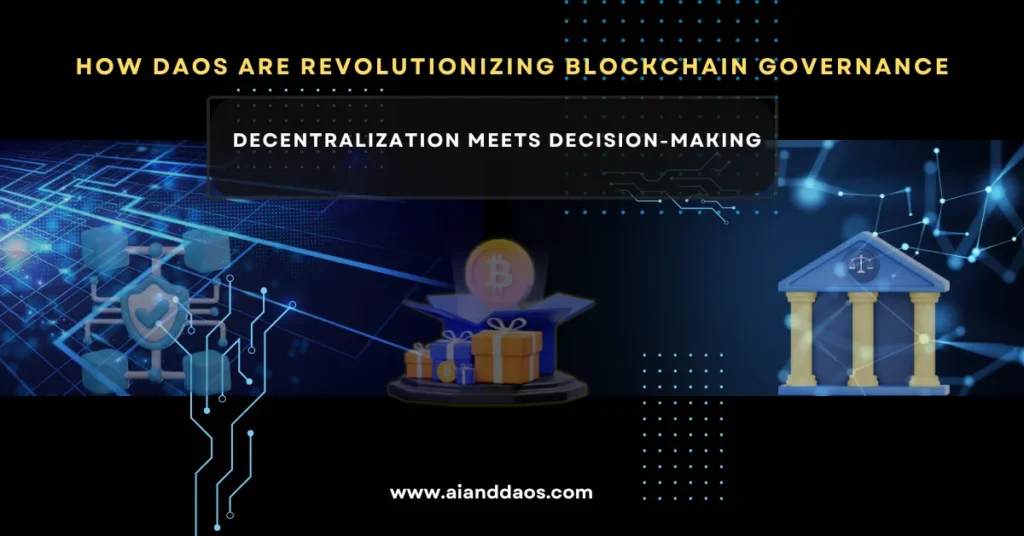
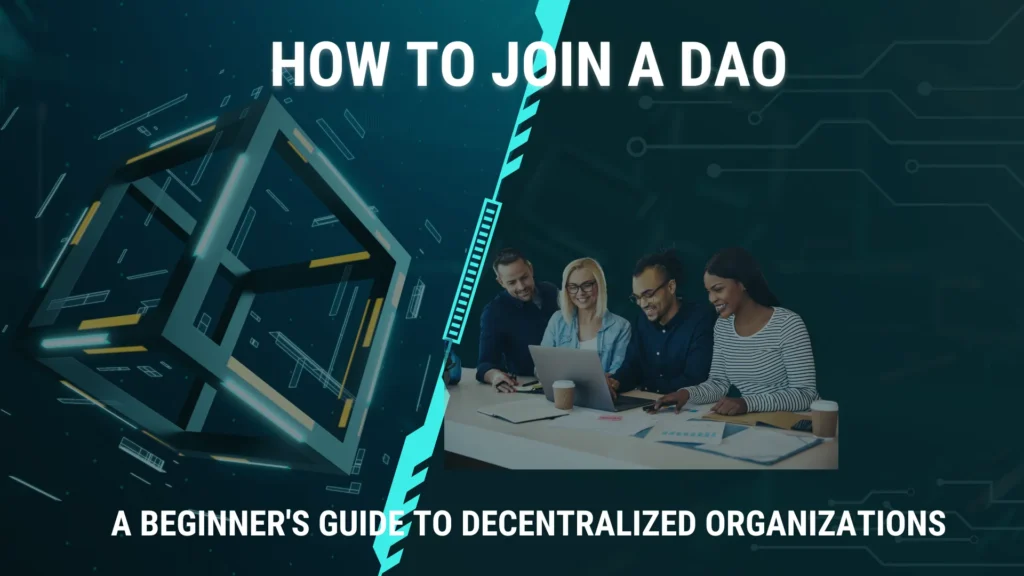
Pingback: How AI and Blockchain Integration Enhancing DAOs in Web 3.0
Pingback: AI in Web3 Content Creation: Innovating DAOs
Pingback: Top 10 AI Tools for Web3 Content Creation in 2025
Pingback: Implement AI in DAOs: A Guide to Smarter Governance
Pingback: AI in Web3 Marketing: The Future of Personalization
Pingback: How Creator DAOs Are Reshaping the Economy in 2025
Pingback: AI for Content Creation in DAOs & Blockchain
Pingback: 10 Ways AI-Powered Personalization is Revolutionizing Web3